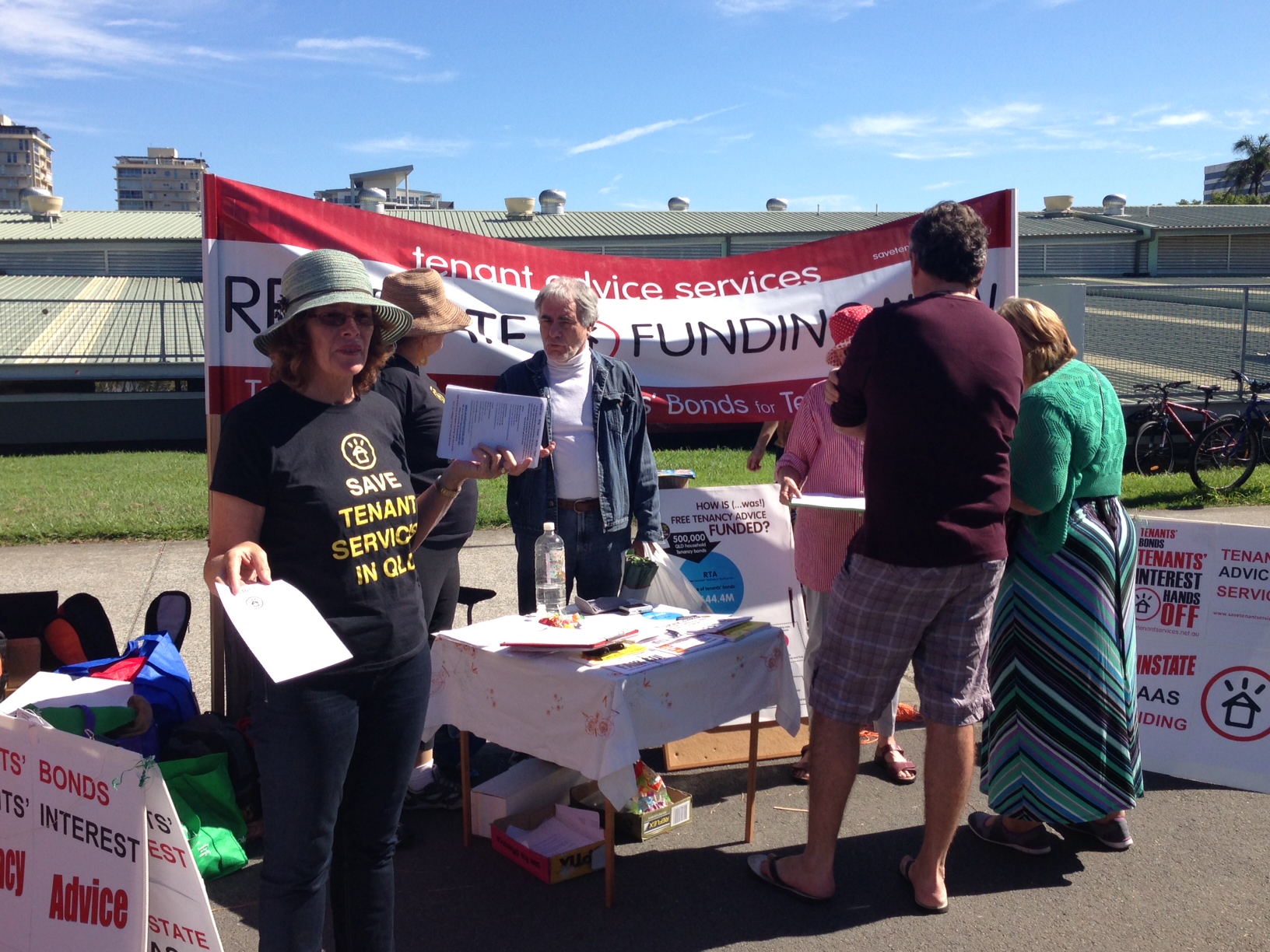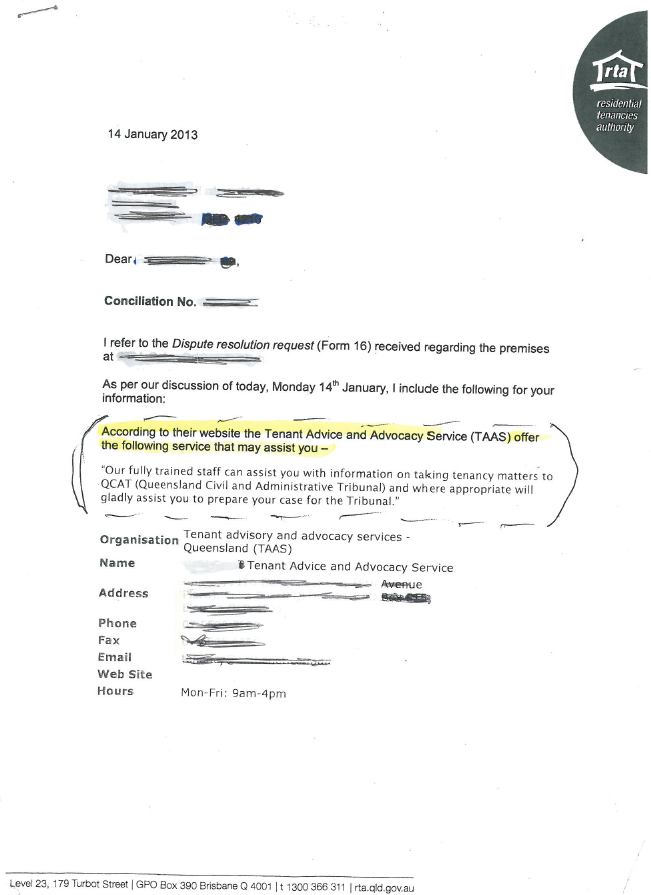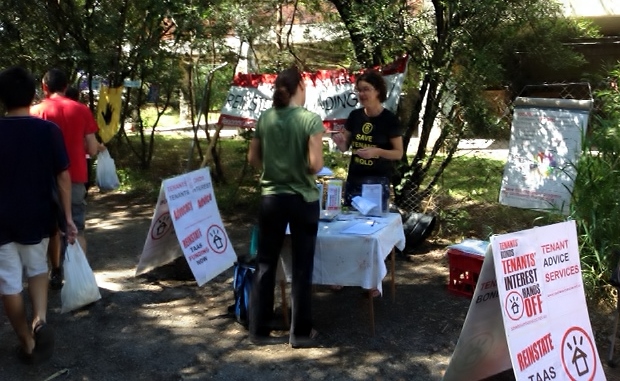Category Archives: Facts
Draft letter – please support the funding offer and Qld tenants
Dear Local Member / Premier
I’m writing to ask if you to support the continuation of Tenant Advice and Advocacy Services (TAAS) in your community.
On May 23 the Commonwealth Government made an offer to the Queensland Government for an additional 6 months’ worth of funding (or $2.5 million) for TAAS services in the state. In return the state government needs to negotiate a long term option for TAAS funding. If accepted, the Queensland government will have saved 14 months’ worth of funding when they need to reapply a small percentage of tenant bond interest to fund these services.
Without the support of the State government, these community-based services will close after June this year. Regional services across the state will be lost and tenants everywhere will no longer have access to specialist services.
While Housing Minister, Tim Mander, has stated that the Residential Tenancies Authority (RTA) and Community Legal Centres (CLCs) can pick up the “slack” with the closure of the TAAS, this is simply not true. The RTA is an impartial government authority located in the Brisbane CBD. It neither represents tenants nor advocates on their behalf. CLCs already have a large unmet demand and are not in a position to provide advice to an additional 500,000 renting households statewide.
Please let me know what your position is on this matter at your earliest possible convenience. I also ask that you raise this important matter with the Premier to seek his support.
Yours sincerely
Help Save Tenant Services (quickly!)
Your help needed urgently. Here’s some things you can do https://savetenantservices.net.au/how-can-i-help/what-you-can-do-to-help-in-2013/
A TAAS worker’s impassioned plea
The following post got a pretty big response on our facebook page so we thought we’d share it here. For those of you who haven’t seen the standard response supporters are getting from the Premier’s facebook team, we’ll post that at the bottom.
- have lost their jobs are single parents and behind on their rent and are three weeks away from homelessness;
- an elderley gentleman who has had no stove or laundry for two years, rats,mould and no receipts for rent or bond lodged and constantly told to pay more money; Continue reading
ABC’s 7.30 Qld highlights tenant concerns for service loss
Take a look at these issues on ABC’s 7.30 Queensland here.
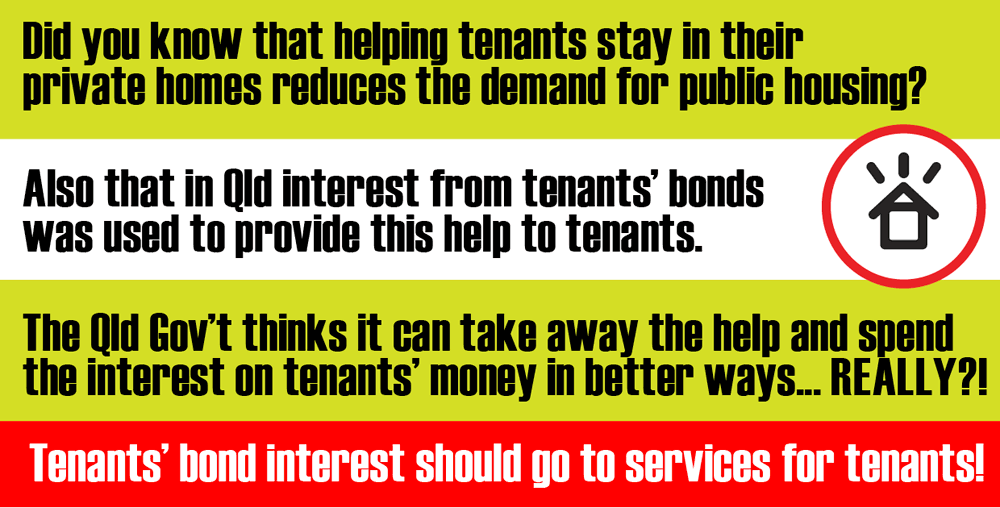
A small piece of pie…….
Remember our graph about how TAAS was funded? Things you can do to help restore TAAS funding, click here.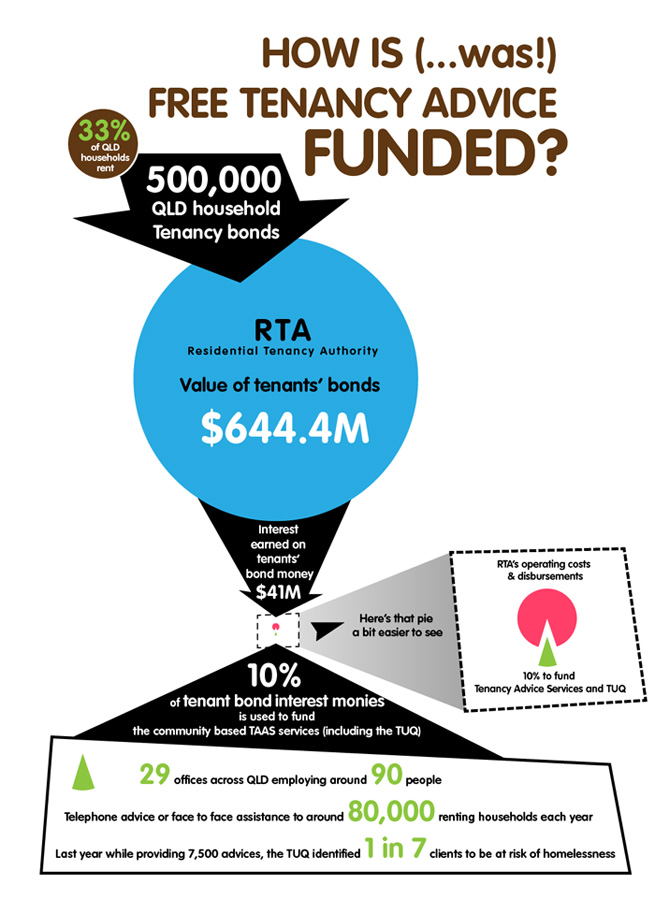
Tenant bond interest for tenant services!
NSW study – TAAS reduces homelessness
 A six month study of vulnerable tenancies in NSW shows the intervention of skilled tenant advice and advocacy workers averted homelessness in 82% of the time. Read the TUNSW blog about the study here
A six month study of vulnerable tenancies in NSW shows the intervention of skilled tenant advice and advocacy workers averted homelessness in 82% of the time. Read the TUNSW blog about the study here
One of the many ways TAAS differs from RTA
Minister Mander’s comments misconceived
 Yesterday the Minister for Housing and Public Works responded to a question in Parliament about the effect of the de-funding of the Tenant Advice and Advocacy Services (TAAS) program.
Yesterday the Minister for Housing and Public Works responded to a question in Parliament about the effect of the de-funding of the Tenant Advice and Advocacy Services (TAAS) program.
In the face of cutting funding to all 23 services statewide, TAAS workers across the state have expressed concern and bitter disappointment over the Minister’s misconceptions about the Program and work of TAAS, and the undervaluing of the skill level required to provide these services. You can read the Hansard record here and we will also add it to the end of the post.
Here are several reasons why what the Minister said is, at best, misconceived:
- Providing tenancy advice is about empowering tenants. We try to get tenants to self-advocate by giving them the advice, skills and tools to run their own matter. There is rarely enough resources to meet demand. This work is often done by telephone which helps services to meet the needs of as many clients as possible. The level of support provided to tenants is escalated if there is a need – e.g. they may have a disability, have literacy issues, English as a second language, it may be a complex matter, the client may be in an emotional state – and the worker might prepare documents, make representations on their behalf or more formally represent them. Much of this work requires some face to face interaction or at least documents to be reviewed. Because a lot of the work is on the phone does not mean that it is not different from the RTA’s information provision.
- ‘we see that 60 per cent of the core service outcomes were reported as unresolved’ – this refers to data the services are required to collect. What it means is that in 60% of cases when giving advice to tenants the services don’t know what the outcome of the matter is. It simply means that at the time of giving the advice – how to seek compensation from the lessor for example, the worker doesn’t know the outcome regarding the claim.
- The work requires a high level of training and expertise and this expertise accumulates over time. To say that there are lots of services which could fill the void truly underestimates what’s required to deliver accurate up to date and quality advice. Continue reading
Hansard – Tenant Advice and Advocacy Service – April 16
April 16 Tenant Advice and Advocacy Service
Mr JUDGE: My question is to the Minister for Housing and Public Works regarding the imminent loss of the Tenant Advice and Advocacy Service. Does the minister foresee any adverse consequences associated with the Newman government’s decision to cease funding to this service in terms of increasing the risk of homelessness and placing additional pressure on the already strained public housing system? If so, what plans are being put in place to address these critical issues?
Mr MANDER: I thank the honourable member for his question. Last year, this government had to make some very tough decisions because of the debt that we inherited from the previous government. One of those tough decisions was to stop funding for the TAAS services that were operating throughout this state. But we did it for other reasons as well. Advocacy and advice to tenants is offered through a whole range of different avenues. Of course, the greatest way it is offered is through the Residential Tenancies Authority—the RTA—and also through other community organisations. Just last week I heard a quote from the Salvation Army in Townsville, which talked about the fact that quite a few non-government organisations supply advocacy for people to get into housing and that `as far as advocacy groups go, it doesn’t seem to be a shortage problem in Townsville’. I am hearing stories like that right across the state.
A review a couple of years ago by the previous government of the TAAS services brought out a couple of very relevant points. When we look at their performance report produced by the department, we see that 60 per cent of the core service outcomes were reported as unresolved, or unknown. A further 27 per cent were reported as info only. This is a gold plated service where 27 per cent of its business is duplicating the role of the RTA. In fact, the same report reveals that three quarters of TAAS services are provided over the phone and in writing, not face to face.
This government believes that those services are important, but they are being offered at the moment in ways that are far more cost effective. We are not into wasting money. We want to use that money for—and this pun is intentional—concrete solutions. We will put roofs over people’s heads with the money that we will save through that money that currently goes to TAAS services. I am looking forward to announcing some of those new arrangements in the next few weeks, which will show very practical solutions to helping the 20,000 people in Queensland at the moment who regard themselves as homeless.
Unlike the opposition, which is very good at scaremongering—going out and frightening the living daylights out of people rather than providing practical solutions—we will not fall into that trap. I am looking forward to talking about those solutions and helping those people put a roof over their heads, which is everybody’s right in this state.
Community suppports tenant services
Scotland & Qld: a potted history of centrailsed bond collection
I t’s only two years since bonds taken from tenants in Scotland have had to be deposited in a prescribed place. Before that they were kept in the pocket (or bank accounts) of landlords and we’re guessing that at least some tenants had difficulties getting their bonds back at the end of their tenancy, no matter what condition they left the property in. Here’s a link to information on the Scottish tenancy deposit scheme here.
t’s only two years since bonds taken from tenants in Scotland have had to be deposited in a prescribed place. Before that they were kept in the pocket (or bank accounts) of landlords and we’re guessing that at least some tenants had difficulties getting their bonds back at the end of their tenancy, no matter what condition they left the property in. Here’s a link to information on the Scottish tenancy deposit scheme here.
We guess that’s what used to happen in Scotland because that’s what it was like in Queensland. In 1986 the Tenants’ Union of Queensland was formed by a group of tenants and concerned organisations who were tired of bonds being unfairly withheld at the end of tenancies. Then in 1988, under the Ahern National government, the original tenancy advice program was funded in response to housing issues arising from development around the World Expo 1988 site.
The Tenants’ Union and other tenant advocates pushed for centralised bond lodgement and were key to the formation of the Rental Bond Authority (RBA) in 1989. The formation of the Authority was strenuously opposed by the real estate and property owner organisations. Continue reading
Did you see our cinema ad?
The following cinema advertisement was produced by Save Tenant Services last year, before the Commonwealth stepped in with emergency funding. Some of our supporters will have seen it before but many will not. We thought we’d replay it. Remember,the emergency funding for the TUQ and 22 local tenant advice services runs out at the end of June. If you have time, please help our campaign to secure on-going monies, here’s some suggestions how.
Information for tenants affected by floods and storms in Queensland
See the link to the Tenants’ Union of Queensland’s fact sheet
http://tuq.org.au/wp/wp-content/uploads/2013/01/Info-for-tenants-affected-by-floods-updated-29-1-13.pdf

